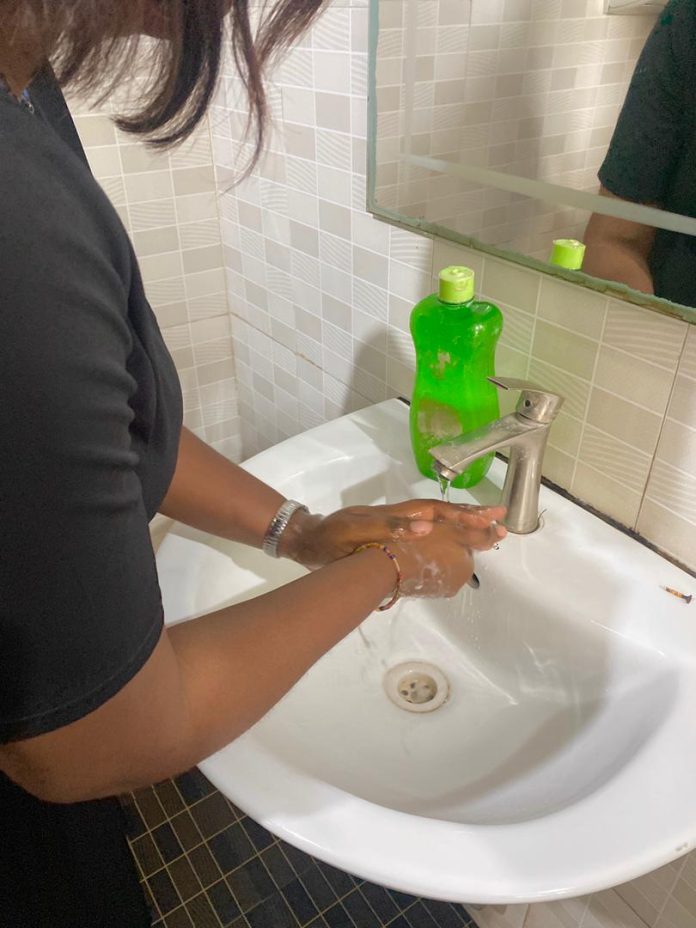Handwashing is one of the most critical ways of protecting oneself from unseen particles or germs that can be harmful to human health.
Aside from that, it also helps human beings stay clean from dirt.
Despite its significance, most people seem to view handwashing as an optional activity.
No! Handwashing is not optional; it is a must.
Tell me why you do not wash your hands after using the toilet.
I guess you want to say that you only went there to urinate, not to defecate.
Did you touch the door? Did you flush the urine? Yes. Do you know someone went in there to defecate and used the same hands to flash the toilet?
After coming into contact with the unseen particles, you also emerged to touch the doors in your house, office, school, and other locations.
Can you imagine the spread of germs around you and the people who will come into contact with them?
Do you also believe that washing your hands before eating is optional? The level of germs you are carrying around will come back to haunt you. Yes..
Did you know that when you get home from town, washing your hands is critical? I am sure you will say you did not touch anything or do anything to soil your hands, but did you sit in a vehicle, open any doors, touch money, or shake hands with anybody? Tell me why you did not wash your hands when you got home.
I have personally observed people walk out of washrooms without washing their hands.
Yes, I have also seen people eat without properly washing their hands.
I guess you think you are different. Did you wash your hands before grabbing that biscuit, fruit, candy, or munchie in your mouth?
What about the children? Do you wash their hands frequently?
I remember one day I went to a shop to get a drink, and the attendant was sweeping before I got there. Immediately after she saw me, she dropped the broom, used her clothes to clean the dust on her palms, and went to get the drink for me. This was a total turn-off.
I guess she didn’t realize that the broom itself carried a lot of particles other than dust, and she needed to properly wash her hands before serving me.
You are also not unique; could you explain why you don’t wash your hands after using the sweeping brushes, mop sticks, collectors, and bins?
Nurseslabs defines handwashing as the act of cleaning one’s hands with any liquid, with or without soap, in order to remove dirt or microorganisms. It is the most effective measure for reducing the risk of transmitting infectious diseases.
Hand washing is the most crucial and fundamental technique for preventing and controlling infections. According to NursesLabs, hand washing is the most effective infection control measure.
The World Health Organization defines hand hygiene as a general term that encompasses handwashing, antiseptic handwash, antiseptic hand rub, and surgical hand antisepsis.
World Health Organisation (WHO)
According to the World Health Organization (WHO), thousands of people die every day around the world from infections acquired while receiving health care.
WHO explains that the hands are the main pathways for germ transmission during health care.
“Hand hygiene is therefore the most important measure to avoid the transmission of harmful germs and prevent health care-associated infections,” WHO stated.
Diseases
When the COVID-19 pandemic broke, handwashing with soap was described as one of the best defenses against the virus, along with other public health measures such as maintaining physical distance, avoiding crowded places, practicing cough etiquette, and wearing a mask wherever recommended.
UNICEF estimates that diarrhea kills 1.1 million children every year, and pneumonia-related illnesses take another 1.2 million child lives. Washing hands with soap prevents infections in a more straightforward and cost-effective way than any single vaccine, the agency stressed.
It continued that washing hands with soap at critical moments, such as after using the toilet or before handling food, is an easy and affordable intervention that can reduce the incidence of diarrhea among children under the age of five by almost 50 percent and cut respiratory infections by as much as 25 percent.
According to the accounts listed above, one needs soap and clean running water to wash their hands.
Narrowing it down to Ghana, the question is: how many people, households, offices, schools, and facilities have access to safe, clean, and potable water to wash their hands?
How far has education gone for people who do not know the importance of hand hygiene to have knowledge about it?
Safe and Clean water
In March 2024, while marking World Water Day, the Ghana Statistical Service (GSS) updated the public on its 2022 Ghana Demographic and Health Survey (GDHS), which revealed that approximately one in every five individuals (19.1%) in Ghana faced inadequate access to drinking water in the month before the survey.
The Northern Region recorded the highest percentage, with one in every three people (32.1%) not having enough drinking water.
The Oti Region followed closely with 31.2%, while the North East was 26.2%.
The Upper East (14.0%) and Ashanti (14.5%) regions reported the lowest percentages of people without enough drinking water, with figures less than half that recorded in the Northern and Oti regions.
The service also revealed that, nationally, 6.5 percent of the population had to travel more than 30 minutes round-trip to access drinking water.
According to recent reports, residents in the Bug-yinga community in the Northern Region struggled to use the same water at home due to animal access issues.
Residents of the Atwima Nwabiagya North District of the Ashanti Region also suffered from a water shortage in April.
Aside from that, an acute water shortage recently struck Funsi, the district capital of Wa East.
Imagine people are struggling to have safe water to drink. What would be the importance of handwashing for such people?
SDGs
Meanwhile, Sustainable Development Goal 6 declares the importance of achieving “clean water and sanitation for all.”.
Goal 6 of the SDGs targets that by 2030, countries should achieve universal and equitable access to safe and affordable drinking water for all.
Additionally, by 2030, countries should implement integrated water resources management at all levels.
Global Handwashing
The Global Handwashing Partnership founded Global Handwashing Day, according to the University of North Carolina Water Institute, as an opportunity to design, test, and replicate creative ways to encourage people to wash their hands with soap at critical times.
Every year on October 15th, over 120 million children worldwide wash their hands with soap on the inaugural Global Handwashing Day in 2008.
Since 2008, community and national leaders have used Global Handwashing Day to spread the word about handwashing, build sinks and tippy taps, and demonstrate the simplicity and value of clean hands.
Since then, Global Handwashing Day has continued to grow. Governments, schools, international institutions, civil society organizations, NGOs, private companies, individuals, and more endorse Global Handwashing Day.
On the other hand, the United Nations in October 2011 reminded people across the world that simply washing hands with soap and water remained the most cost-effective way to prevent diseases and urged everyone to motivate others, especially children who are easily infected by disease-carrying germs present in dirty hands, to make it a habit.
Per the above indicators, hand washing is very critical, and every human being must practice it frequently.
Some people say African germs do not kill; they may not kill you now, but they may harm you sooner or later.
Read Also: Menstrual Hygiene :Stakeholders call for tax exemptions on sanitary products
Handwashing Principles
Meanwhile, here are the principles and concepts surrounding hand hygiene:
Instead of using a basin, you must use running water in a sink that drains.
You may use antibacterial soap if necessary.
You must rub your hands against each other for at least 30 seconds to facilitate the removal of microorganisms.
Long nails and jewelry trap germs. It is best to keep your fingernails short. If you wear a ring, it’s best not to remove it before hand washing so that you can also wash it.
It is always better to use disposable paper towels than cloth towels when drying hands to ensure that you can only use them once.
In the absence of the ideal sensor or foot pedal, you should always turn off the faucet or tap using a paper towel.
Nurseslabs also recommends using soap dispensers until they are completely empty. After emptying, wash the dispenser before refilling it.
Read Also: Fighting Infertility: Men also have issues, stop stigmatising women- Experts
Way forward
While sensitizing the public, it is also critical that stakeholders intensify education on the importance of handwashing.
It is also the responsibility of the government, particularly the water authority, to guarantee that every Ghanaian has access to safe, clean, and potable water.
Let us adopt the attitude of frequently washing our hands. This will save you and your family from preventable diseases.
#washyourhands #WaterAidGhana #WASH #GlobalHandWashingDay #SDGs
Ghana| Atinkaonline.com| Porcia OforiwaaOfori


























